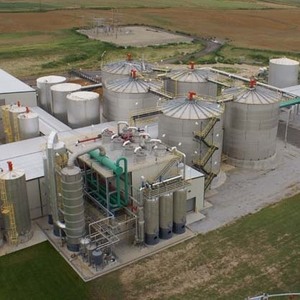Kan. ethanol plant to build renewable diesel facility on site

Photo: Prairie Horizon Agri-Energy
May 1, 2014
BY Prairie Horizon Agri-Energy
Mike Erhart, CEO and general manager of Prairie Horizon Agri-Energy, announced the formation of a partnership with WB Services LLC on May 1, to expand its biofuels footprint by integrating a renewable diesel production facility into the existing ethanol plant.
“With this announcement, Prairie Horizon continues to meet its goal of providing leadership in the renewable fuels industry,” said Erhart. “We are very excited and eager to partner with WB Services and get under construction and put this product in the marketplace.”
Advertisement
WB Services will design, construct and operate the renewable diesel plant utilizing patented renewable diesel process technology. WB Services is a renewable fuels company recognized for its experience and expertise in plant construction, optimization and management, as well as process development and engineering.
According to Ron Beemiller, president and CEO of WB Services, “This plant will be the first of its kind—the first renewable diesel plant to fully integrate into an existing ethanol operation,” he said. “This is a very exciting time for both Prairie Horizon Agri-Energy and WB Services, we look forward to working with PHAE’s exceptional leadership team on this project.”
Advertisement
Currently, Prairie Horizon Agri-Energy is a 40 MMgy nameplate ethanol plant, which began operations in 2006. With the completion of the facility, renewable diesel nameplate production will be 3 MMgy, and will also produce denaturant, fuel gas, and steam for use at the existing facility. Prairie Horizon Agri-Energy also has a significant investment in the renewable and biodiesel plants under construction by Green Energy Products in Sedgwick, Kan.
Design work has already begun, and construction is scheduled to begin mid-year.
Related Stories
The USDA reduced its estimate for 2024-’25 soybean use in biofuel production in its latest WASDE report, released May 12. The agency expects soybean oil use in biofuel to increase during the 2025-’26 marketing year.
HutanBio's microalgal biofuel production shown to be net-negative in an independent life cycle assessment by EcoAct
HutanBio on May 8 announced that the production process for its proprietary HBx microalgal biofuel achieves net-negative carbon emissions, based on an independent cradle-to-gate life cycle assessment (LCA) conducted by EcoAct.
According to a new economic contribution study released by the Iowa Renewable Fuels Association on May 6, Iowa biofuels production has begun to reflect stagnant corn demand throughout the agriculture economy.
Repsol and Bunge on April 25 announced plans to incorporate the use of camelina and safflower feedstocks in the production of renewable fuels, including renewable diesel and sustainable aviation fuel (SAF).
U.S. operable biofuel capacity in February was unchanged from the previous month, according to data released by the U.S. EIA on April 30. Feedstock consumption for February was down when compared to both January 2025 and February 2024.
Upcoming Events










